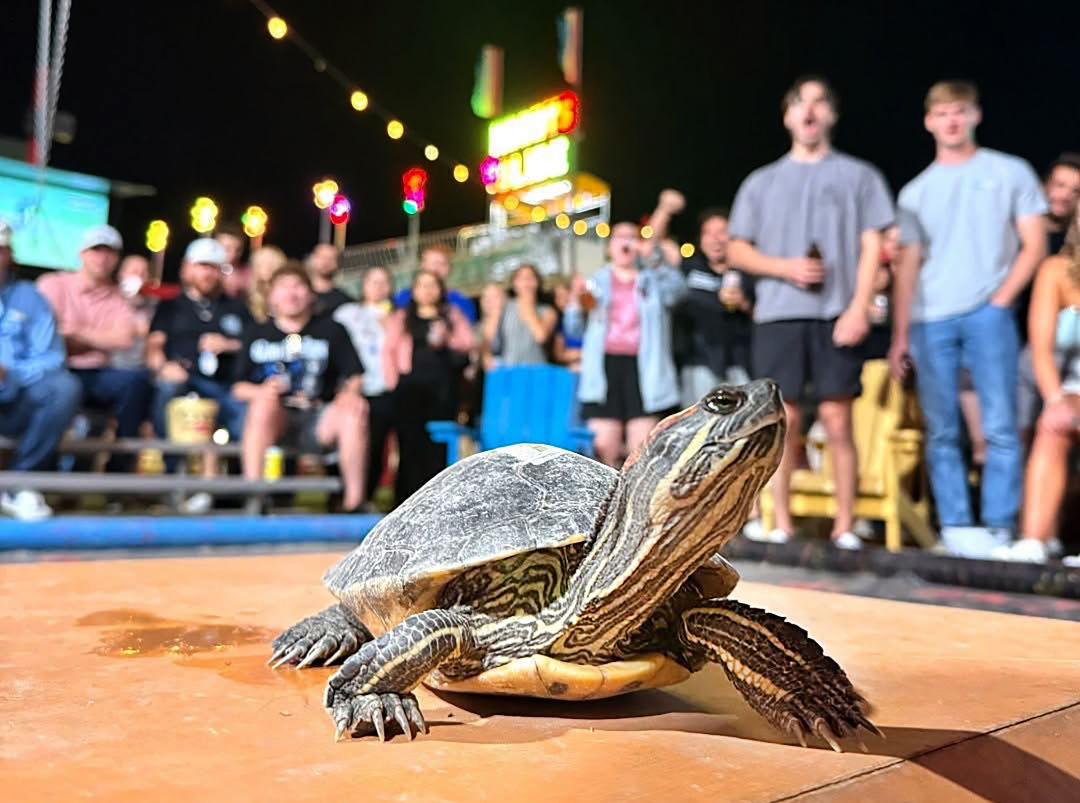The High-Energy, Low-Speed Charm of Little Woodrow’s Turtle Races

Image: Courtesy Little Woodrow's
Houstonia’s The Must List tells you about something going on in Houston that you absolutely cannot miss.
In the popular imagination, turtles fall into one of three categories: pets, soup, and totally radical pizza-loving, scaly superheroes who yell, “Cowabunga, dude!” Outside of Aesop’s fables, however, no one seems to consider these robust reptiles favorable entrants in the track and field sector—except Little Woodrow’s. The Texas sports bar chain, which originated in Houston’s Midtown, launched its weekly series of turtle races more than a decade ago, and it’s now in its 17th season.
“We're always doing fun, crazy, weird, unique events, and turtle racing was one of those events,” says Kevin Fielder, Little Woodrow’s regional director of operations. “People are excited about it.”
Held at multiple locations throughout the Houston area on Thursday nights, these beloved spectacles draw crowds that rival the size of an average suburban Little League game, albeit without any parents screaming in the ref’s face over a displeasing call. It certainly crackles with the same sense of giddy anticipation and a celebration of athletic aptitude, with the heady fizz of cold beer and the wafting aromas of tamales and pizza. Only instead of cheering for plucky kids, everyone’s rooting for their favorite red-eared slider.
“They're making signs. They're making T-shirts. They love the turtles as much as we do,” Fielder says. “And that pure enjoyment and excitement, it's unbelievable to watch.”
A typical turtle race event is free, but invites guests to snag a complimentary ticket for their number one pick (the one named “James Franco,” whose naming predates public revelations about the disgraced actor’s alleged sexual misconduct, has been on a hot streak lately, according to Fielder). The ref selects a “Bucket Babe” from the audience, who lifts up the large titular implement and gently releases the competitors onto the starting platform. Then, they’re off to the races as the turtles make a run for it.
They can be surprisingly fleet-footed, with a few always bolting as soon as the barrier lifts. Some races last only around a minute when eager turtles dart to the finish line. Other turtles prefer a more leisurely life, refusing to leave their place at the starting point and instead holding their heads up high like sports royalty. Race rules vary from bar to bar, night to night. Sometimes the winner is the first to make it to the finish line. Sometimes, it’s the slowpoke—the last turtle standing on the starting block—who takes the crown. The only constants: You won’t ever get bored, and, if your chosen turtle wins, you’ll be compensated with a fun prize, like a koozie or a drink.
The turtles, too, get their fair share of celebration. “We have a very well-trained turtle team that takes care of them at all times. They're part of our family, just like the family dog,” Fielder says. The only difference? A bit more competitive edge.
Unlike human athletes, the turtles don’t travel around for the races. Instead, they live in an undisclosed location away from the energetic bar environment and are assigned to specific Little Woodrow’s spots to minimize their amount of time on the road. On game days, turtles prep by lounging around, eating, and taking walks if they’re so inclined, Fielder says. It’s hardly the intensive drills and protein-packing you’ll find behind the scenes with the Astros or Rockets. In fact, hard-core competitors like Slow Rogan, Mustache Ride, Shelly Roll, and Just the Tip spend all their time both on and off the track being, well, turtles.

Image: Courtesy Little Woodrow's
Fielder says staff must keep the reptiles’ longevity in mind, too. Red-eared sliders can live up to around 30 years in captivity, and some of the racing turtles, like James Franco, have already been under Little Woodrow’s care for more than a decade. And they’re set to keep entertaining audiences in the decades to come, with a family that just keeps growing.
Though the turtle races are Houston-born, they’ve since made their way into other Little Woodrow’s bars in the region, including, most recently, the outpost in Webster, which is now hosting its inaugural turtle-racing season. As Little Woodrow’s expands into other cities, so, too, does the bar’s signature show: Lubbock’s location has already hosted five seasons of turtle races; Stone Oak in San Antonio, nine. It’s impressive growth for such a lighthearted event, but also not surprising. Turtle races are just plain joyful and a great way to leave the day’s stressors behind. It’s difficult to not smile along and cheer as the competitors stomp or simply take their sweet time, and even if your favorite speedster (or slowster?) loses, you still win.
The most riveting part, however, seems to be the people, Fielder says: “The community is what brings that excitement.”
Know Before You Go
Little Woodrow’s Thursday-night turtle races at 9 p.m. are free to attend, with no cover charge, but food and drinks cost extra. Visit its website to find participating locations.




